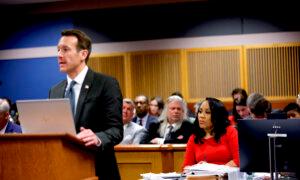Ashleigh Merchant said Fani Willis obtained up to $5 million to prosecute homicides and sexual assault, but used it to investigate the 2020 election instead.
For three days during a contentious evidentiary hearing on a motion to disqualify Fulton County District Attorney Fani Willis from prosecuting a high profile election case, defense attorney Ashleigh Merchant had done the questioning.
On March 6, Ms. Merchant was the one answering questions asked by a Georgia Senate committee investigating the controversy surrounding the high profile district attorney, filling in the blanks of her misconduct allegations.
“You, as a matter of fact, made most of [the allegations],” committee chair Bill Cowsert told Ms. Merchant at the beginning of the hearing, which she was subpoenaed for. She walked the senators through how the motion to disqualify came about, including reviewing some invoices in detail and discussing Georgia law.
The committee is tasked with investigation, and if necessary, the introduction or revision of state statutes governing how district attorneys hire prosecutors, Mr. Cowsert explained. The committee has nothing to do with the ongoing effort to disqualify Ms. Willis.
Ms. Merchant represents Michael Roman, a co-defendant in the racketeering case that originally named former President Donald Trump and 18 other co-defendants. Four have since accepted plea bargains, and Ms. Merchant revealed her client was one of the first defendants approached with a plea that included a misdemeanor charge and a $5,000 fine, but he rejected it because he and his attorney wanted the charges dropped entirely.
None of the material shared with the committee was obtained through state-produced discovery, and therefore was not subject to attorney-client privilege. In fact, much of the financial information shared was public record.
It is not typical for a district attorney in Georgia to appoint a special prosecutor, Ms. Merchant explained, so there was a lot of discussion among attorneys when Nathan Wade was appointed. This led Ms. Merchant to pull up records concerning Mr. Wade, which are public under the state’s open records law.
She discovered that he had not filed an oath, which has since been resolved, which led Ms. Merchant to do additional probing to discover that Mr. Wade was being paid about five times more than similar appointments and through atypical channels.
Trump Prosecutor Submitted Unusual Invoices: Attorney
Ms. Merchant said she submitted open records requests to all 159 counties of Georgia, but did not receive responses from every county. Of the ones she received, only two other counties had district attorneys appointing special prosecutors, who are paid $40 to $60 per hour.
In Fulton County, three special prosecutors were hired, two at $250 per hour and one at $150 per hour. Ms. Merchant said she has not been able to obtain the latest contracts and invoices for all attorneys, but what she has been able to review shows that Mr. Wade, billing at $250 per hour, has been paid the most out of the three.
“Nobody does this except Fulton County,” Ms. Merchant said. Usually, outside attorneys are hired for specialized knowledge, or if there is a conflict that would require an attorney to work outside of the office. This led Ms. Merchant to do additional probing, though a judge has already determined that Mr. Wade’s qualifications are not relevant to the motion to disqualify Ms. Willis and her team from the case.
Mr. Wade, has, however, previously been hired as an outside investigator for Cobb County, which also resulted in controversy. Sonya Allen, a former classmate of Mr. Wade’s, had hired him at the rate of $550 per hour to investigate a Cobb County jail that was under fire for inmate deaths, and Mr. Wade testified that he had not filed any formal report upon the end of his review and that it was not an official investigation.
Ms. Allen is now employed at the Fulton County District Attorney’s office as well.
Unusually High Payments
So far, county records show Mr. Wade has been paid more than $650,000 in Fulton County, and the money has to come from local funds, according to state law.
The senators noted unusual billing processes, which Ms. Merchant then read aloud in the meeting.
Attorneys working for the county are typically required to bill by a tenth of an hour, or in six minute increments, and required to be specific as to what work was done, and then typically will have their invoices cut down by the approving body, testified Ms. Merchant, who was previously a public defender in Fulton County.
Ms. Merchant said copies of these checks were previously available to her through open records requests, but as of late she has not been able to view the most recent invoices and checks. She had also obtained some but not all records of where the funds used to pay Mr. Wade came from, including $100,000 from a seizure fund.
Local Approval for Special Prosecutors
According to Georgia statutes, district attorneys’ budgets are controlled at the county level, not state level. This also requires district attorneys to request and gain permission from a county board of commissioners to hire an outside attorney.
Ms. Merchant could not find records of requests Ms. Willis made to hire Mr. Wade, Anna Cross, or John Floyd, leading her to comb through budget meeting video archives.
Around the time Ms. Willis made these hires, she had gone to the board of commissioners to ask for additional funding.
“Why am I here? Crime is on the rise, historic mismanagement, the COVID backlog,” Ms. Willis presented to the board in a slideshow presentation.
This took place in September 2021, before Mr. Wade was hired and before the special purpose grand jury investigating the 2020 election was empaneled.
Ms. Willis was granted $780,000 for that year and up to $5 million the following year to hire 55 new employees in response to her request to prosecute a backlog of homicides and sexual offense cases. Her request did not mention investigating the election.
In court filings, Ms. Willis’ office has argued that she is a state constitutional officer and not subject to local laws.
Ms. Merchant added that her office essentially argued that once the money was budgeted for her office, the district attorney had sole discretion over how it was spent and that the voters had authorized her to do that.
Conflict of Interest
Senators asked Ms. Merchant where the conflict of interest was, and Ms. Merchant pointed to a statute that requires district attorneys to disclose all gifts over $100 from anyone doing business with her office, which includes contractors such as Mr. Wade. Ms. Willis had testified that she never reported any gifts from Mr. Wade because she did not see them as gifts.
Mr. Wade had been part of Ms. Willis’ transition team in the months leading up to January 2021 when Ms. Willis took office, and then contracted in November 2021 before a special purpose grand jury was requested the following January, and had his contract renewed the following November with a higher monthly cap.
Mr. Roman was not originally recommended to be charged by the special purpose grand jury, and Ms. Merchant has alleged that prosecutors purposely enlarged their case.
It could have been three cases, she told the senators, one related to Coffee County voting machines, one related to federal officials, and one related to local Georgia alternate electors.
The racketeering designation “expands the litigation,” ensuring that it would have continued over a year even if defendants such as her client pleaded out, Ms. Merchant said. And even if her client had taken a plea bargain, he would still be involved for the duration of the case with the obligation to testify against the remaining defendants.
Wade Attorney Shared Details
During Ms. Merchant’s testimony, she was also able to lay out the timeline of her correspondence with Terrence Bradley, a former associate of Mr. Wade’s who was thought to be the source of information used in Ms. Merchant’s allegations.
Ms. Merchant explained that she had already been independently investigating the district attorney’s hiring of outside counsel when Mr. Bradley called her.
An article had been written about all the open records requests filed by Ms. Merchant, which is also public information, and Mr. Bradley had been concerned and wondering if he needed an attorney.
Mr. Bradley and another attorney had previously had a fee-sharing partnership with Mr. Wade, and had both been brought contracts from Ms. Willis’ office.
Later, Ms. Merchant ran into Mr. Bradley in court on a day she was being sworn in for a different case. They were sitting with other attorneys in a conference room when Mr. Bradley shared additional details about the Wade-Willis relationship with Ms. Merchant.
Ms. Merchant had not previously known that Mr. Wade was going through a divorce, but Mr. Bradley had represented Mr. Wade during part of the process and he was visibly upset when describing what had happened.
“He didn’t like what was happening in the divorce proceeding,” Ms. Merchant testified, such as leaving his wife, a stay-at-home mother for 26 years, without alimony and asking her to move out as soon as their youngest child left for college.
Mr. Bradley told Ms. Merchant several specific details, she testified, including the fact that Mr. Wade and Ms. Willis met up at hotels and that Mr. Wade had a garage opener to Ms. Willis’ homes.
“He detailed a lot of stuff … a lot of travel,” Ms. Merchant said. She was able to independently verify the trips through subpoenaed bank and travel agency records.
Mr. Bradley was also very specific that Ms. Willis’ relationship with Mr. Wade began when Ms. Willis was still a judge. Mr. Bradley had also instructed Ms. Merchant to find a former “bestie” of Ms. Willis’, whom he thought had been fired from the district attorney’s office.
This led Ms. Merchant to identify Robin Bryant Yeartie, who was a press liaison for Ms. Willis. Ms. Yeartie testified that she saw Ms. Willis and Mr. Wade together before he was hired and there was “no doubt” it was a romantic relationship.
During testimony, however, Mr. Bradley was notably taciturn, mostly answering that he could “not recall” or had been “speculating” in earlier messages to Ms. Merchant, and backtracked on several points in what Mr. Cowsert described as possible “witness tampering.”
Original News Source Link – Epoch Times
Running For Office? Conservative Campaign Consulting – Election Day Strategies!


